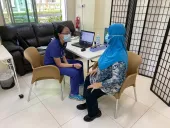
Singapore's healthcare spending to jump over 5% of GDP by 2020
But it's still below regional average spend.
Singapore, with a population of about 5.7 million, has boosted its healthcare spending in recent years as its population ages, and amidst the rise of lifestyle-related illnesses, such as cardiac disease, obesity, diabetes and cancer.
According to a release from SGX, however, healthcare spending in the city-state remains relatively low as a proportion of gross domestic product.
It averages about 4% of GDP, below the average 6.6% of GDP for countries in Asia and Australasia, according to data from the Ministry of Health, the World Bank and the World Health Organisation.
This proportion is expected to increase to over 5% of GDP by 2020, reflecting robust growth in government spending on healthcare infrastructure and higher subsidies for public health insurance schemes.
Here's more from SGX:
As for the rest of Asia, demographics and infrastructure are favourable for longevity and healthcare spend. Average life expectancy at birth across Asia has increased by as much as seven years to reach 73.4 years old between 1990 and 2012, driven by rising living standards, better nutrition, water and sanitation, as well as greater access to quality health services, OECD data showed.
The OECD expects the share of population aged over 65 years in Asia to quadruple in the next four decades, reaching 26% in 2050 from 7% in 2012, surpassing the global average. Asia has 1.2 doctors per 1,000 people, compared to 3.2 for the OECD average, and 2.8 nurses per 1,000 people, compared to 8.7 for the OECD average. The number of hospital beds per person in Asia is almost a third less than the OECD average.
Regional healthcare spending has also been gathering momentum – between 2000 and 2012, the growth rate in per capita health spending in real terms was 5.6% in Asia, outstripping average GDP growth of 4.3%, OECD data showed. Asia’s demographics, coupled with the current shortfall in comparative services, supplies and technology, offer Singapore healthcare providers increased opportunities to participate in the region’s burgeoning demand.













 Advertise
Advertise













